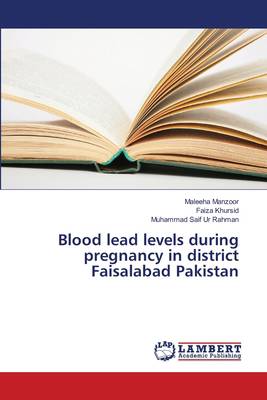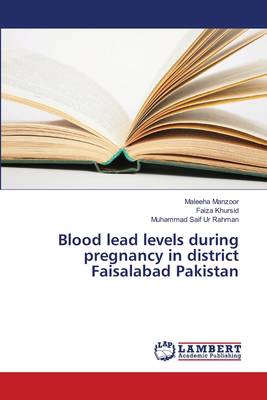
- Afhalen na 1 uur in een winkel met voorraad
- Gratis thuislevering in België vanaf € 30
- Ruim aanbod met 7 miljoen producten
- Afhalen na 1 uur in een winkel met voorraad
- Gratis thuislevering in België vanaf € 30
- Ruim aanbod met 7 miljoen producten
Zoeken
Blood lead levels during pregnancy in district Faisalabad Pakistan
DE
Maleeha Manzoor, Faiza Khursid, Muhammad Saif Ur Rahman
Paperback | Engels
€ 64,45
+ 128 punten
Omschrijving
The purpose of the present study was to monitor lead concentration in blood of the pregnant women of Faisalabad. One hundred women blood samples were taken and performed wet digestion. Lead level in blood was determined by flame atomic absorption spectrophotometry. Results indicated that the mean concentration were higher in those were not taken proper calcium dairy products and supplements (Mean ± SE) 2.67±0.27 and 1.46±0.23 as compared to women those were taken proper dairy products and calcium supplements 0.72±0.08 and 0.73±0.09 respectively. Results were showed significant association with lead level and women of older age groups, those who were taken or not calcium rich food and supplement. About 56% women showed <1 mg/dl and 44% >1mg/dl lead level respectively. They were having mean lower level of lead from its threshold level 5 µg/dL as described by the CDC and WHO. It concluded that improving the educational status, dietary supplementation, nutritional standards and decrease in pollution could help improve the health problems of pregnant women in the rural as well as in urban areas.
Specificaties
Betrokkenen
- Auteur(s):
- Uitgeverij:
Inhoud
- Aantal bladzijden:
- 84
- Taal:
- Engels
Eigenschappen
- Productcode (EAN):
- 9783659391880
- Verschijningsdatum:
- 8/05/2013
- Uitvoering:
- Paperback
- Afmetingen:
- 150 mm x 220 mm
- Gewicht:
- 136 g

Alleen bij Standaard Boekhandel
+ 128 punten op je klantenkaart van Standaard Boekhandel
Beoordelingen
We publiceren alleen reviews die voldoen aan de voorwaarden voor reviews. Bekijk onze voorwaarden voor reviews.








